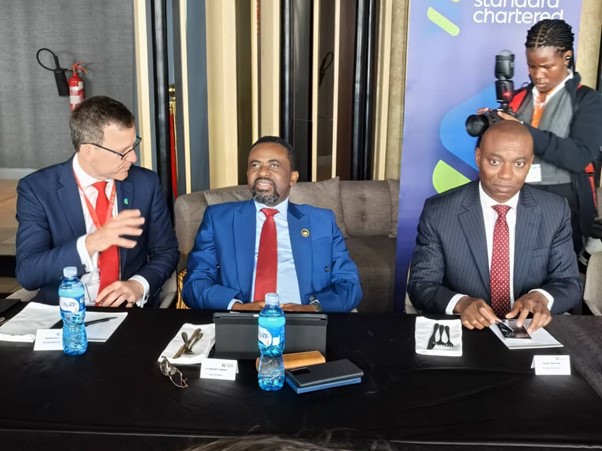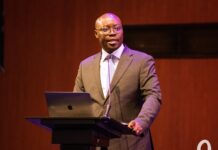By Joshua Worlasi AMLANU
The Bank of Ghana Governor, Dr. Johnson Asiama, has indicated that government is signalling a renewed commitment to long-term investment partnerships, underpinned by a genuine macroeconomic turnaround driven by substantive reforms rather than rhetoric.
Speaking at a private investor roundtable convened by Invest Africa and Standard Chartered on the side-lines of the African Development Bank’s Annual Meetings, Dr. Asiama said Ghana’s economy is “back on a credible path” after a period of volatility marked by inflation, currency depreciation and fragile investor sentiment.
“The Ghana opportunity is not theoretical — it is real, it is unfolding and the time to engage is now,” Dr. Asiama told an audience of international investors and financial leaders at the AfDB meeting.
He emphasised consistency in policy, improving fundamentals and a commitment to shared-value partnerships.
The roundtable, themed ‘De-risking Growth: Building confidence in African sovereign finance’, comes at a moment of cautious optimism for Ghana. After a turbulent 2024, the country has seen a sharp rebound in several key indicators. Real GDP grew 5.7 percent last year, exceeding expectations and is forecast to expand four percent in 2025 despite global headwinds.
The cedi has appreciated 21.5 percent year-to-date, reversing a 19.2 percent depreciation the previous year.
Similarly, inflation has edged down from 23.8 percent in December to 21.2 percent in April, aided by tighter monetary policy and a stabilising exchange rate. Foreign reserves climbed to US$10.67billion – equivalent to 4.7 months of import cover – while Ghana posted a current account surplus of US$2.12billion in the first quarter.
“These gains are not accidental. They reflect deliberate action,” Dr. Asiama said.
He pointed to a coordinated macroeconomic strategy focused on stability, confidence and growth.
The Bank of Ghana has maintained a tight monetary stance, reinforced liquidity management through active open market operations and worked closely with the Ministry of Finance on fiscal consolidation.
Government, for its part, has implemented aggressive expenditure controls and domestic revenue reforms. These moves have been bolstered by a staff-level agreement with the IMF under the fourth review of the Extended Credit Facility and an S&P credit rating upgrade from selective default to CCC+.
Still, the central bank Governor was careful to frame stabilisation as only the beginning. Sustaining investor confidence, he said, will depend on further reforms in public sector governance, financial intermediation and the investment climate.
“Trust is the real currency in global finance,” he noted. “And it must be earned through consistency, transparency and reform-minded leadership.”
The Bank’s recent decision to hold its policy rate steady at 28 percent reflects that strategy.
Dr. Asiama said the Monetary Policy Committee was unanimous in its decision, aimed at consolidating disinflation gains and keeping expectations anchored.
Structural reforms in liquidity management are also underway. The central bank is shifting from passive tools like the unremunerated cash reserve ratio to a more active open market operations regime – moves expected to improve liquidity control and, over time, support targetted credit expansion to the private sector.
Ghana’s foreign exchange market is also getting a regulatory facelift. According to the Governor, stricter enforcement of FX rules, bolstered reserve accumulation and transparency in market pricing have helped support the cedi’s recovery.
“The cedi’s performance is not an illusion. It is a reflection of real reforms, real discipline and real resilience,” he said.
Financial sector indicators remain mixed. While capital adequacy ratios have improved to 15.8 percent as of April, non-performing loans remain elevated at 23.6 percent.
Nonetheless, Dr. Asiama expressed confidence that BoG’s supervisory role and effective loss provisioning were restoring sector resilience.
Beyond macro indicators, Ghana is pitching itself as a strategic hub for investors seeking exposure to green infrastructure, fintech, logistics and light manufacturing — sectors the country sees as aligned with its climate and industrialisation ambitions under the AfCFTA framework.
“As confidence returns, we see a clear window to reposition Ghana as a preferred investment destination in West Africa,” Dr. Asiama said.
Investor engagement, however, will not be driven by incentives alone. The Governor stressed that Ghana is not chasing speculative capital, but rather patient, strategic investors aligned with national development goals.
“We believe in responsible capital and in co-creating solutions that support inclusive growth and in de-risking through governance, not just guarantees,” he concluded.










